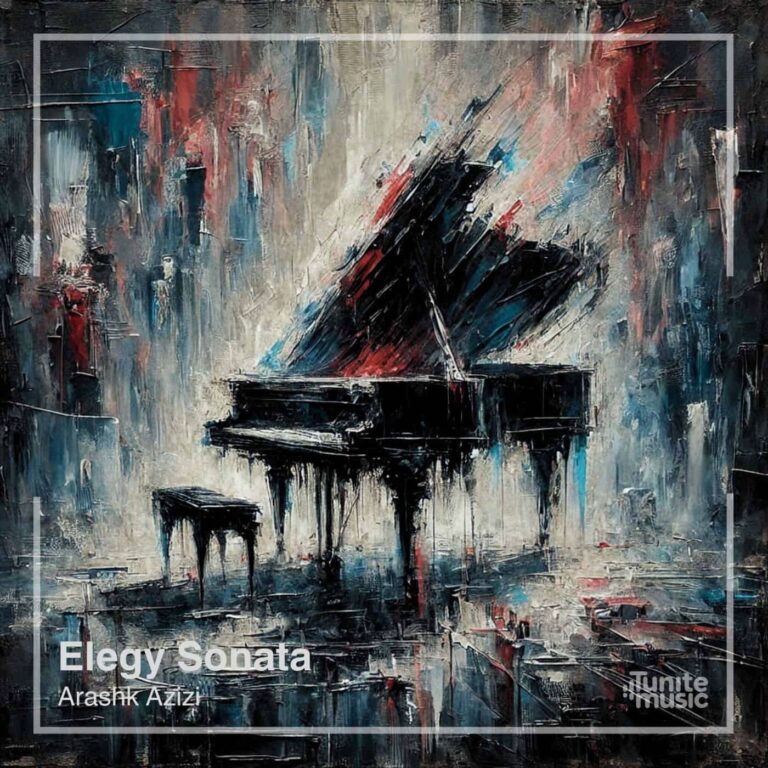
Elegy Sonata
Piano Sonata No. 4 in E minor, Op. 11 “Elegy” by Arashk Azizi is a deeply emotional work that explores the many facets of death—fear, mourning, despair, and anger. The four-movement sonata blends traditional and contemporary elements, including Azizi’s innovative Piano Poem form. Through symbolic themes and intimate personal touches, Elegy Sonata offers a profound meditation on grief and the fragility of life.
Piano Sonata No. 4 in E minor, Op. 11 “Elegy”
Composed and Performed by: Arashk Azizi
Tunitemusic record label proudly presents Elegy Sonata, a deeply moving work by contemporary composer Arashk Azizi. Rooted in Azizi’s signature Piano Poem form, this four-movement sonata explores the many emotional facets of death: the fear of its inevitability, the sorrow of mourning, the despair of loss, and the anger at our powerlessness in the face of mortality.
As Azizi reflects:
“Death is an inevitable part of life. I believe that, on a conscious or subconscious level, we are all always aware of it. Throughout history, many works of art have directly explored the theme of death, and in Elegy Sonata, I too have taken it as my central subject.“
Elegy Sonata is, at its core, a meditation on death and its impact on the human spirit. Through carefully crafted variations of a central theme, Azizi paints an emotional journey through fear, mourning, and confrontation. The sonata is not merely a composition but a deeply personal narrative infused with symbolic elements that reflect Azizi’s own experience with loss.
The sonata is not a linear narrative but a series of emotional vignettes that jump above and beneath the surface of grief. From the ticking clock that symbolizes the steps of death to the hopelessness of mourning and the catharsis of rage, it invites the listener into a raw and universal exploration of loss.
Throughout Elegy Sonata, Azizi includes deeply personal elements that connect the work to his own experiences. For example, in the second movement, Lament, the left-hand B note strikes 19 times after the main melody ends—a symbolic reference to the date of Azizi’s father’s passing on the 19th of August. Similarly, the inspiration for the opening movement, Epilogue, came directly from Chopin’s Prelude in E minor. Azizi was listening to this piece when he received the news of his father’s death, and the idea of writing an Epilogue, as opposed to a Prelude, immediately took shape in his mind. These personal touches add layers of intimacy and meaning to an already emotionally profound composition.
At the core of the sonata lies Azizi’s innovative Piano Poem form, which blends the melodic intimacy of the Nocturne with the improvisational freedom of the Impromptu. Like a symphonic poem, the Piano Poem offers a narrative experience where a central theme undergoes transformation, guiding listeners on a journey of grief, memory, and catharsis.
The Movements
Epilogue
The sonata begins with a somber and delicate prelude, Epilogue, reflecting the quiet sadness of an unexpected ending. This short yet poignant movement captures the stark finality of loss, with a left-hand figure reminiscent of Chopin’s Prelude in E minor. It is the beginning of a journey into the depths of grief.
Lament
The second movement, Lament, transforms the Epilogue’s theme into a darker, more mournful variation. A persistent low B in the left hand represents the relentless ticking of time—each note a stark reminder of death’s approach and the anguish it leaves behind.
Remnant
Drawing influence from Erik Satie, Remnant is melancholic and introspective. With its subtle modernist harmonies, it reflects on what remains after loss, like memories that linger in the air. It mourns not only what is gone but also what continues to exist in the wake of grief.
Tempest
The final movement, Tempest, erupts in raw, unrelenting energy. Here, the emotions of sorrow transform into anger and despair. Built on a rhythmically complex 7-beat structure and enriched with contemporary harmonic progressions, Tempest revisits the sonata’s main theme in its most expressive and volatile form. It is a cathartic outpouring of emotion—a storm of sound and feeling that embodies the full tumult of grief.
For listeners, the sonata is a universal reflection on the fragility of life and the inevitability of mortality. Its seamless fusion of traditional and contemporary influences—echoes of Chopin, Satie, and Azizi’s unique Piano Poem form—creates a work that is timeless, evocative, and profoundly expressive.
With Piano Sonata No. 4 “Elegy”, Arashk Azizi cements his reputation as a composer of extraordinary emotional depth and vision. This sonata offers a journey through the many faces of grief, speaking directly to the soul and leaving listeners with a deeper understanding of the complexities of life and loss.
Plasticmag
Ultimately, Elegy Sonata is a meditation on the inevitability of death and its defining role in shaping life; challenging the listener to confront the fragility of existence while finding beauty and meaning in impermanence.
Sinusoidalmusic
What makes this piece particularly effective is its ability to transport listeners into an introspective headspace – it’s the kind of composition that encourages closing your eyes and letting the music guide your thoughts. The immersive quality of the piece creates a truly beautiful listening experience.
Endsessions
Arashk Azizi gave a hard blow of reality that made us remember that life is ephemeral, through a classical atmosphere he has left us expectant, his dream landscape captures a fierce emotional storm that will affect you a lot.

La Folia
This breathtaking solo piano work is a true testament to his virtuosity as both a pianist and composer. Released under the prestigious Tunitemusic record label, the album takes you on an emotional journey through the captivating theme and variation form, exploring the depths of the seven sins.
“La Folia” is nothing short of a contemporary classical music masterpiece, showcasing Matteo’s extraordinary talent as a composer and pianist. If you appreciate virtuosic solo piano works and crave an emotional journey through the seven deadly sins, this album is an absolute must-listen.

TELEION
In their groundbreaking album “Teleion: Fragments of Ancient Greek Music,” the dynamic duo Lopez & Arevalos embark on a mesmerizing journey to unearth the sounds of ancient Greece. Inspired by surviving fragments of melodies and texts, they breathe new life into age-old compositions, bridging the gap between past and present with their innovative interpretations.

Elektronika
“Elektronika,” Vincent Roy’s second album, offers eight ambient electronic tracks that create a soothing, calming experience. Each piece showcases exceptional quality with meticulous mixing and mastering. The vintage synth sounds are sure to captivate and impress listeners, making this album a standout in the electronic music scene. Dive into the tranquil and mesmerizing world of “Elektronika” and elevate your music collection with Vincent Roy’s masterful auditory journey.